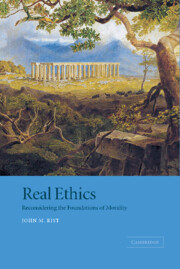Book contents
- Frontmatter
- Contents
- Acknowledgements
- Introduction: Ethical crises old and new
- 1 Moral nihilism: Socrates vs. Thrasymachus
- 2 Morals and metaphysics
- 3 The soul and the self
- 4 Division and its remedies
- 5 Rules and applications
- 6 The past, present and future of practical reasoning
- 7 Autonomy and choice
- 8 Ethics and ideology
- 9 God and ethics
- Bibliography
- Index
8 - Ethics and ideology
Published online by Cambridge University Press: 16 January 2010
- Frontmatter
- Contents
- Acknowledgements
- Introduction: Ethical crises old and new
- 1 Moral nihilism: Socrates vs. Thrasymachus
- 2 Morals and metaphysics
- 3 The soul and the self
- 4 Division and its remedies
- 5 Rules and applications
- 6 The past, present and future of practical reasoning
- 7 Autonomy and choice
- 8 Ethics and ideology
- 9 God and ethics
- Bibliography
- Index
Summary
RESPONSIBILITY, CORRECTION AND COMMUNITY
At this point in our story we move from man as a moral (and spiritual) individual to man as member of a community. For in arguing that anti-realism finds its starkest expression in the all importance of individual autonomy and ‘free’ choice, we cannot treat the individual as isolated in his own world. We must consider realism and its converse not only in terms of their effects on individual lives but of how those effects work themselves out in society, transforming society in their own image.
What then will be the proper role of society and the state in a realist and non-realist world? In the first instance I shall focus on the inculcation of responsibility, since I have argued that taking or declining responsibility for one's actions both present and past is a key to reducing or increasing that splitting of the self which indicates, in realist terms, moral progress or regression. In treating of such responsibility I must consider responsibility both for oneself and to other members of one's community – thus beginning to identify the interface between ‘private’ ethics and social and political concerns. My method in this political section of the book will again be ‘Zenonian’: in this case I shall consider the horrors in which we must recognize ourselves entangled if it is false that, as Aristotle, Plato and their Christian successors have always insisted, we humans are social and political animals.
- Type
- Chapter
- Information
- Real EthicsReconsidering the Foundations of Morality, pp. 205 - 256Publisher: Cambridge University PressPrint publication year: 2001



